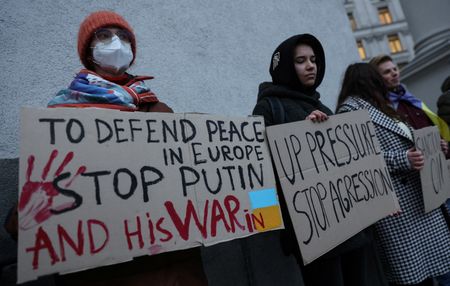 1
1 1
1

By John Chalmers and Robin Emmott
BRUSSELS (Reuters) -European Union ministers said they would agree on Tuesday the first round of tough but incremental sanctions against Russia over its formal recognition of two breakaway regions in eastern Ukraine.
Russian President Vladimir Putin’s announcement on Monday, followed by his signing a decree on the deployment of Russian troops to Donetsk and Luhansk, drew international condemnation and immediate U.S. sanctions.
The EU has repeatedly said it was ready to impose “massive consequences” on Russia’s economy if Moscow invades Ukraine but has also cautioned that, given the EU’s close energy and trade ties to Russia, it wants to ratchet up sanctions in stages.
“We’ve got to ensure that whatever happens, Russia will feel the pain … to make sure Russia has absolutely no incentive to go further,” said Irish EU affairs minister Thomas Byrne.
EU member states’ ambassadors met in the morning to prepare sanctions ahead of an emergency gathering in Paris of their foreign ministers later in the day.
“This afternoon, the Council will decide the sanctions that we are going to take,” EU foreign policy chief Josep Borrell said in Paris.
Not all of the bloc’s 27 member states have the same relation to Russia or dependency on its gas, which could complicate the adoption of sanctions.
EU officials and diplomats said some EU countries, including Austria, Hungary and Italy, Russia’s closest allies in the bloc, would prefer more limited sanctions in response to Putin’s move on eastern Ukraine.
Others want to see a fuller, tougher range of measures discussed in recent weeks for the event of a Russian invasion of Ukraine to be rolled out now. Baltic, central and eastern European states say tough sanctions should be imposed immediately as Russia is already showing military aggression towards Ukraine.
Italian Prime Minister Mario Draghi, whose country relies on Russian for much of its gas, told a news conference in Rome that any sanctions should not include energy imports.
“How we react as European Union will define our character and indeed the future of Europe,” Lithuanian vice minister of foreign affairs Arnoldas Pranckevičius said at a meeting in Brussels.
The sanctions “should not be symbolic. If we want to deter further actions from president Putin, if we want to stop the war from happening, we need to move ahead with serious measures.”
An EU official said the bloc would discuss on Tuesday would discuss a wider package of sanctions than only travel bans and asset freezes on individuals.
A senior EU diplomat told Reuters there was “a whole escalation ladder, starting with Russian individuals and moving up to finance, trade, and eventually energy. So, technically, a lot is possible.”
“The problem politically is how to craft sanctions that all can agree to,” the diplomat said, speaking on condition of anonymity as discussions were ongoing.
Diplomats have said new measures could include sanctions targeting Russian oligarchs, a ban on EU transactions with private Russian banks and cutting all Russian banks from the SWIFT network that is the lifeblood of international money transfers.
Such sanctions would likely be approved by EU leaders at a special summit in Brussels, although no such meeting has yet been called.
“What’s at question today is how far they will go,” Irish Foreign Minister Simon Coveney told RTE broadcaster. “I suspect it will be incremental because everybody wants diplomacy to reduce tension.”
(Reporting by John Chalmers, Robin Emmott, Ingrid Melander, Clement Rossignol, Marine Strauss, Padraic Halpin and Crispian BalmerWriting by Ingrid MelanderEditing by Raissa Kasolowsky)